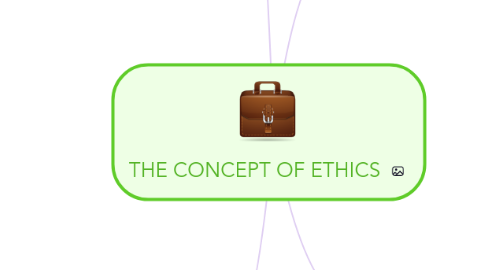
1. ETHICS IN ISLAM
1.1. ILM AL AKHLAQ
1.1.1. Akhlaq is a broad sense, therefore, subsumes all actions that are characterized as amal salih (virtuous deeds) in the terminology of the Quran.
1.2. MACROCOSMIC KINGDOM OF GOD
1.2.1. God as the Creator (Khaliq)
1.2.1.1. The Prophet
1.2.1.1.1. Man
1.3. MICROCOSMIC KINGDOM OF MAN
1.3.1. Khulq
1.3.1.1. Capacity of knowledge
1.3.1.1.1. Freedom of will
1.4. CHARACTER (KHULUQ')
1.4.1. Imam al-Ghazali: Character is an establish condition of the inner soul, fom which actions proceed easily without any need for reflection or deliberation.
1.5. THE NATURE OF MAN
1.5.1. body
1.5.1.1. healthy
1.5.1.2. sick
1.5.1.2.1. the science that deals with the health and diseases of the body is the science of Medicine
1.5.1.3. dead
1.5.2. soul
1.5.2.1. healthy
1.5.2.2. sick
1.5.2.2.1. the science that deals with the health and diseases of the soul is the science of Ethics (Ilm al Akhlaq)
1.5.2.3. dead
2. REFINEMENT OF CHARACTER
2.1. FACULTIES OF HUMAN SOUL
2.1.1. The rational faculty ( quwwat al-ilm)-knowledge
2.1.1.1. wisdom
2.1.2. The irascible faculty (quwwat al- ghadab)-anger
2.1.2.1. courage
2.1.3. The appetitive faculty (quwwat al-shahwah)-desire
2.1.3.1. temperance / restraint
2.1.4. The faculty of justice- proper balance between the above three aspects
2.1.4.1. good character
2.2. CARDINAL VIRTUES
2.2.1. wisdom
2.2.1.1. a condition of soul which distinguishes true from false in all volitional acts
2.2.2. courage
2.2.2.1. the subjection of the irascible faculty to the intellect
2.2.3. justice
2.2.3.1. a condition and potency in the soul by which it controls the expansion and contraction of anger and desire as directed by wisdom
2.2.4. temperance
2.2.4.1. the disciplining of the appetitive faculty by the intellect and the law
2.3. PURPOSE OF SPIRITUAL STRUGGLE
2.3.1. to attain the balance and moderation which is the middle point between excess and defect
2.4. DEGREES OF PEOPLE
2.4.1. simply ignorant
2.4.1.1. who innocent and without discernment, cannot tell truth from falsehood or beautiful from ugly actions
2.4.1.1.1. can be improved easily
2.4.2. ignorant and misguided
2.4.2.1. who recognize ugly acts for what there are, but not in the habit of acting righteously
2.4.2.1.1. not acting as he should
2.4.3. ignorant, misguided and corrupt
2.4.3.1. not only addicted to evil ways but also believe that those ways are good and to follow them is necessary
2.4.3.1.1. to reform them is impossible
2.4.4. ignorant, misguided, corrupt and evil
2.4.4.1. who has been reared to believe in and to work corruption-proud of doing it
2.4.4.1.1. improvement is the hardest of all
2.5. METHODS
2.5.1. imitation and habituation (by doing something good repeatedly)
2.5.2. administering opposites (impose punishment to ourselves)
2.5.3. moving from lesser evil to a still lesser evil to the smallest evil (until the smallest evil may be easily cured)
3. DEFINITION
3.1. ETHICS
3.1.1. LITERAL: Derived from Ancient Greek, ethos : character
3.1.2. Technical: The branch of philosophy dealing with values relating to human conduct, with respect to the rightness and wrongness of action.
3.1.2.1. belongs to the group of practical institutions which include etiquette, law and religion
3.2. MORALITY
3.2.1. A doctrine or system of moral conduct.
3.2.1.1. more wider than law- what is moral is not necessarily enforced through law
3.3. LAW
3.3.1. The public statements, a legal code or system of do's and dont's.
3.3.1.1. concerns with acts rather than attitude or state of being
4. MAJOR OF ETHICS
4.1. CONCERNS
4.1.1. the nature of ultimate values
4.1.2. ethical judgements
4.2. AREAS
4.2.1. meta-ethics
4.2.1.1. the study of origin and meaning of ethical concepts
4.2.2. normative ethics
4.2.2.1. general theories of ethics
4.2.3. applied ethics
4.2.3.1. the application of moral theories to practical moral problems
4.3. THEORIES
4.3.1. virtue ethics
4.3.2. deontological ethics
4.3.3. teleological ethics
